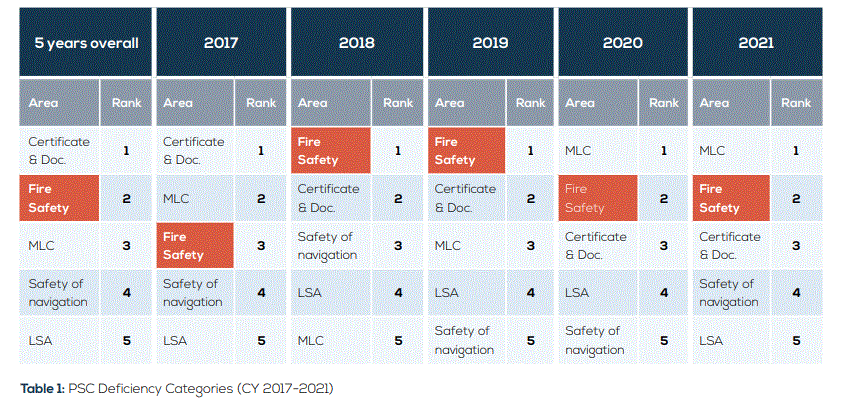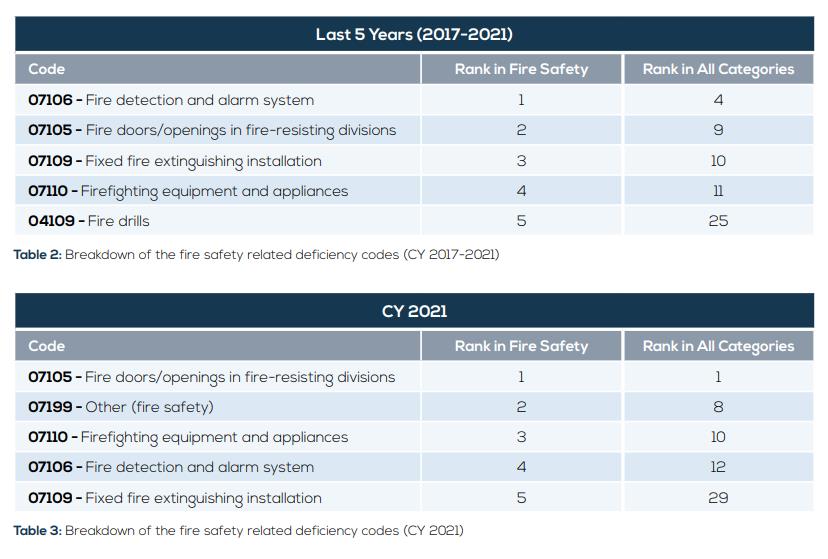Fire Safety is a key area of concern during PSC inspections. It is widely known that fire is one of the worst case scenarios for an on board emergency. PSC data analysis from the last five years shows that there is a lot of concern for onboard fire safety while ships have still several issues to address in this area.
 Taking into consideration analysis of Table 1, we may notice that fire safety remains a key PSC finding that appears in the top 3 Deficiency Categories for five consecutive years. In particular, the Fire Safety Deficiency Category (Code: 07###) involves 26 different deficiency codes covering mostly equipment and system issues.
Taking into consideration analysis of Table 1, we may notice that fire safety remains a key PSC finding that appears in the top 3 Deficiency Categories for five consecutive years. In particular, the Fire Safety Deficiency Category (Code: 07###) involves 26 different deficiency codes covering mostly equipment and system issues.
The operational aspect of fire safety (fire drills) is covered by code 04109 and is assigned to Emergency Systems deficiency category. In that respect, PSC codes 07 plus the 04109 should be taken into consideration during the review of Fleet’s PSC performance for Fire Safety.
During a PSC inspection, Port State Control Officer will check the condition, availability and working status of the fire fighting equipment and systems, as well as related documentation.
 The most common findings for the top 5 fire related deficiencies reported during the last 5 years are as follows:
The most common findings for the top 5 fire related deficiencies reported during the last 5 years are as follows:
1. 07106 _ Fire detection and alarm system
- Inadequate equipment condition
- Alarm not activated
- Blocked detector
- IMO symbols for fire detectors of fire detecting and alarm system not posted
- Fire alarm panel showed disconnected zones
2. 07105 – Fire doors/openings in fire-resisting divisions
- Installed door can not meet fire doors’ requirements
- Fire doors blocked to open position
- Holes on fire door
- Fire doors not closing tight
- Several doors closing devices not properly adjusted
3. 07109 – Fixed fire extinguishing installation
- Maintenance records missing
- Crew not familiar with equipment operation
- Auto sprinkler fire extinguisher pump set in manual mode
- Fire alarm repeater out of order in fire control station
- During test of fire-extinguishing system, smoke detector did not activate, preventing the system from automatically operating to extinguish a fire.
4. 07110 – Firefighting equipment and appliances
- Maintenance records missing
- Not inspected as required
- Fire hoses missing from stations
- Fire hoses connected to fire main showed excessive leakages
- Fire main found repaired with rubbers and clips
5. 04109 – Fire drills
- Not conducted as required (intervals)
- Inadequate participation (specific crew not participated repeatedly to drill)
- Crew failed to properly demonstrate their ability to fight a shipboard fire during drill
- Crew not familiar with the use of fixed firefighting systems
- Fake fire drills were signed by Master
It is a requirement of SOLAS Reg. II-2/14 that all fire protection equipment shall be kept in good order and readily available for use. It is also a requirement of SOLAS Reg. I/11 that any defects which affect the safety of the ship or its continued compliance with statutory requirements are to be reported to class and the flag administration
The Gard Club highlighted that companies must bear in mind that, although compliance with fire safety requirements is controlled by authorities and classification societies, it is the company’s responsibility to establish procedures to ensure that the ship is maintained in compliance with the provisions of the relevant rules and regulations (ISM Code Ch.10) and that the crew is properly trained and provided with adequate resources/tools to perform their tasks in accordance with the required standards (ISM Code Ch.6 and Ch.3 respectively).
A well trained crew can be prepared to sufficiently respond to a fire on board and use the operational fire fighting equipment. In such case, situational awareness, effective communication and team work are key factors. What is more, crew members should not consider fire drills and familiarization with equipment as another item to tick in the checklist.
A right mindset is needed in order all crew to consider fire safety as a top priority and get fully prepared to respond in such emergency. In that regard, it is important to be aware of the procedures and be ready through continuous trainings and drills to use the equipment properly during fire emergency. As the Gard Club has noted: ‘’training and experience transfer between crew should aim to create a mutual understanding of all fire hazards present on board and their potential consequences’’.

































































